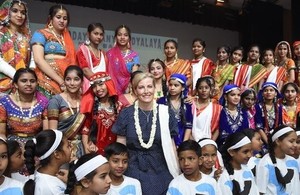Countess of Wessex visits India, celebrates UK-India collaboration
Her Royal Highness The Countess of Wessex on a five-day tour covered initiatives in Hyderabad, Mumbai and New Delhi.

Her Royal Highness The Countess of Wessex
HRH The Countess of Wessex, who has been in India since 29 April, embarks upon the final leg of her tour today. Her visit celebrates successful UK-India collaboration on tackling global challenges such as vision ailments, preventing gender-based violence in conflict, and promoting women’s empowerment.
In Hyderabad, Her Royal Highness visited three hospitals, in her role as Vice-Patron of The Queen Elizabeth Diamond Jubilee Trust, to see the impact the charity has had in reducing avoidable blindness in babies born prematurely. Nearly 26% of all premature babies are born in India and are susceptible to Retinopathy of Prematurity. If left untreated, the disease can cause irreversible blindness. Thanks to the collaborative efforts of the Indian Ministry of Health and the Trust’s partners, national guidelines on the disease have now been integrated across the country’s health system.
Speaking after her visit, Her Royal Highness said:
I was so thrilled to see the work supported by The Queen Elizabeth Diamond Jubilee Trust in action today. We’ve come a long way - from identifying Retinopathy of Prematurity as our area of focus, to seeing the region wide change that we’ve been a part of. I congratulate the Indian Ministry of Health and Family Welfare, the Public Health Foundation of India, and the Trust for creating this remarkable legacy for the people of India.
While in Mumbai, Her Royal Highness met with Queen’s Young Leaders Deane de Menezes and Aditya Kulkarni, who work to destigmatise menstruation, and reduce maternal and child mortality rates respectively. She also met with members of the OSCAR Foundation who are empowering underprivileged children and youth through football.
In New Delhi, Her Royal Highness hosted a reception celebrating successful UK-India collaboration to advance eye health in India. As Royal champion for ‘Women, Peace, and Security’, she also visited the Indian Armed Forces and United Services Institute. Here she learnt about how India, as the fourth largest troop contributing country to the UN, tackles the issue of women, peace and security - for example through their all-female troop deployment to Liberia, which completed its mission last year.
The Royal visit will conclude today with a school visit celebrating cooperation between British Council and the Delhi Government on cricket-dance sessions through the ‘Changing Moves Changing Minds’ programme, which aims to improve gender equality, and a reception celebrating remarkable women making their mark on Indian society.
Reflecting on the visit, Sir Dominic Asquith, British High Commissioner to India said:
India and the UK share a strategic partnership, based on our common ambition to tackle some of the world’s biggest challenges. Her Royal Highness’ visit has shone a light on our joint efforts to address issues such as eye care to stop preventable blindness, protecting the most vulnerable from violence in conflict zones, and gender equality. A powerful reminder of how, together, we can be a force for good.
Further information
The Queen Elizabeth Diamond Jubilee Trust is a time-limited charitable initiative launched in 2012 to mark Her Majesty the Queen’s 60-year contribution to the Commonwealth. In India, the Trust has helped set up services to screen for and treat Retinopathy in 21 hospitals across 4 districts, serving a population of over 47 million people. The Trust will close, as planned, on 31 January 2020.
Drawing on the work and approach of the Trust, organisations with expertise in eye health have now come together to develop a Vision Catalyst Fund to accelerate systems change and expand universal eye health across the globe. Preparatory work is underway, with a view to the Fund beginning to operate in 2020.
The Queen’s Young Leaders Programme is a four-year initiative to champion and connect young people addressing urgent challenges facing the Commonwealth’s communities. India is home to 26 Queen’s Young Leaders and Highly Commended Runners up.
The OSCAR (Organisation for Social Change, Awareness and Responsibility) Foundation uses football as a medium to teach underprivileged children and youth valuable life skills and responsibility.
The British Council, in partnership with the Marylebone Cricket Club (MCC) and the Royal Academy of Dance (RAD), initiated the programme ‘Changing Moves, Changing Minds’ to address gender inequalities in society using cricket and dance as a creative medium. It promotes positive gender roles in boys and girls and aims to impact 300,000 children across India over the next three years. It aims to enrich children’s lives through integrated dance and sports lessons that encourages girls and boys to play together in planned ‘cricket-dance’ sessions. Enabled by specially designed lesson plans in collaboration with MCC and RAD, pupils are encouraged to collaborate and have conversations about gender equality, working to break down gender stereotypes and develop socially aware and educated citizens.
When Prime Minister Modi visited the UK in April 2018, he and Prime Minister May agreed that the UK and India should be a joint ‘Force for Good’, tackling global issues. The UK’s partnership with India today reflects this ambition. Please contact us for more information on how the two countries are working together.
Media
Check out HRH The Countess of Wessex in India Flickr album for images of the Royal tour.
For media queries, please contact:
Sally Hedley, Head of Communications
Press and Communications, British High Commission,
Chanakyapuri, New Delhi 110021
Tel: 24192100; Fax: 24192400
Mail to: Ashwamegh Banerjee
Follow us on Twitter, Facebook, Flickr, Eventbrite, Blogs, Youtube, Instagram